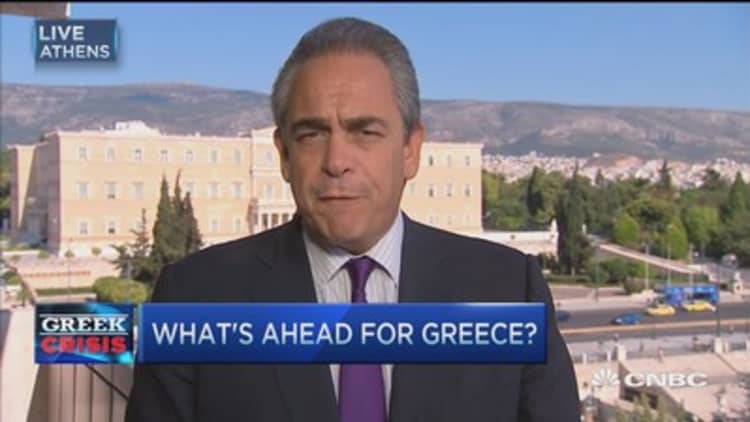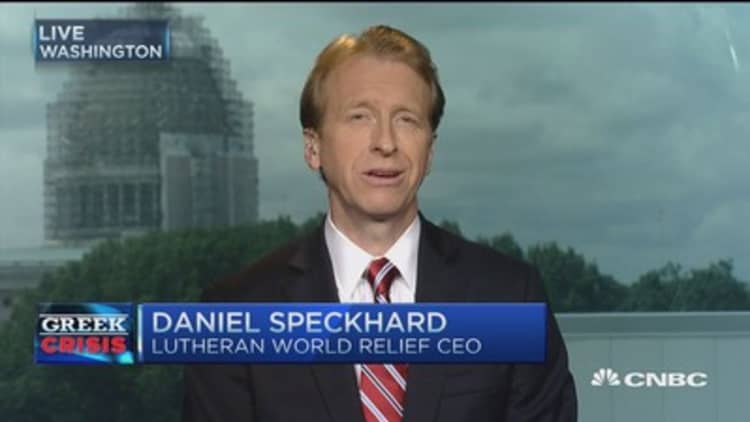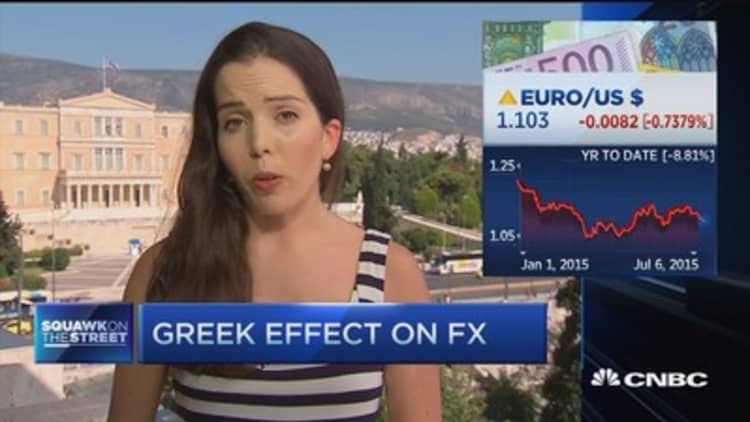


After a referendum in which Greece rejected its creditors' repayment terms, Constantine Michalos, president of the Athens Chamber of Commerce and Industry, said Monday one of the country's main economic drivers, tourism, could suffer.
"The major fear at the moment is that, since we are at the peak of tourist season, [and] we cannot supply basic goods such as food items and pharmaceuticals, we run the risk of [hurting] not just the 10.5 million Greeks, but also the tourist wave that we have during this time of the year," Michalos said in an interview on CNBC's "Squawk on the Street."
On Sunday, nearly 62 percent of Greek voters said "no" to the bailout terms, which sent most global stock markets into a tailspin. The European benchmark German DAX shed slightly more than 1.5 percent Monday, while Japan's benchmark Nikkei 225 fell nearly 2.1 percent.
Greek banks also remained closed Monday, putting the country's economy at a "standstill," Michalos added.
The situation with the Greek banks also has also led to many workers in the country to ask their employers not to pay them, Anastasios Economou, founder of the Monaco-based iGroup, told CNBC's "Power Lunch" on Monday. "I think the idea is that employees trust their employer more than they trust the government," Economou said.
Michalos said that implementing a parallel currency in order to mitigate the damage done to the tourism industry and as a way to jump-start Greece's stagnant economy would be a "measure of last resort."
"One needs to consider that the Greek economy is not a production-based economy. We are dependent on 52 percent of imports as far as our food requirements are concerned. We're dependent on almost 80 percent of all our energy requirements being imported … so we don't have the luxury, if you will, of even considering a national currency. It will be a complete nightmare for eight-to-12 months," he said.
Nevertheless, one expert said that, while many banks and analysts now believe Greece is more likely than not to exit from the euro zone, it is in fact on the right track after the resignations of conservative opposition leader Antonis Samaras and Finance Minister Yanis Varoufakis.
Read More Greece's 'nays' have it--how markets will react
"If that's a sign that the Greeks are more willing to take a multiparty approach, and willing to find some consensus, then that could be what it takes to keep Greece within the euro zone, which would also be in line with the wishes of the Greek people," Elsa Lignos, senior currency strategist at RBC Capital Markets, said in another "Squawk on the Street" interview.
Samaras resigned shortly after the referendum's result was determined on Sunday and Varoufakis followed suit on Monday.
Ian Bremmer, Eurasia Group president, also said he does not believe Greece is close to exiting the euro zone yet.
"Greece is a little bit like the NBA. It's not worth watching until the last five minutes of the game," Bremmer said in a CNBC "Fast Money Halftime Report" interview. "But, when I think about the problems Europe is experiencing ... both domestically and internationally, Europe just looks troubled."
Read More Greek banks to remain closed: Bank Association
Bremmer added that, while some euro zone economies have improved slightly, the political situation will continue to weigh on the region.
"The politics around Europe have never looked so bad," he said. "As a consequence, you're going to see continued skepticism about long-term investments in Europe, and you're also going to see a lot of infighting."
'US in good shape'
U.S. equities managed to pare early session losses Monday despite an outpouring of Greece news.
"From the U.S. perspective, we're in pretty good shape," Joe LaVorgna, chief U.S. economist at Deutsche Bank Securities, told "Squawk on the Street."
"In 2010, when we went through the first of many iterations of the Greek saga, S&P fell about 16 percent from April through July. They were trading around only 1,000 at their lows only a year after we exited recession. Peripheral yields are down substantially since then, so we have made some progress in ring-fencing this situation," LaVorgna added.
This resurgence by U.S. stocks could lead to tougher negotiations between Greece and its creditors, Daniel Speckhard, a former U.S. ambassador to Greece and Belarus, said in a CNBC "Squawk Alley" interview.
"The Europeans will be watching the [U.S.] markets and, if the markets are calm, they're going to be fairly tough with Greece. At the same time, I think Greece is really the canary in the coal mine. I think it's going to highlight some serious structural flaws in the euro zone that are going to come back to haunt them in the future," Speckhard added.


